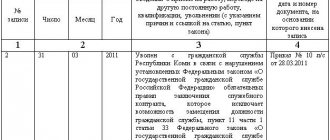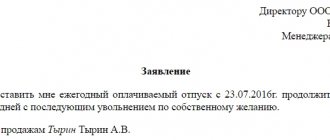The procedure for dismissing a foreign employee has special nuances, since the employee has the citizenship of another country. For these persons, labor legislation provides for a wider list of grounds for terminating relations with the employer than for Russian citizens. The management of the organization, at the time of hiring a citizen of another state, is obliged to study the features of his possible dismissal in the future, so as not to violate the employee’s rights and formalize everything in accordance with current legislation.
What can an employer do when dismissing a foreigner?
Since a citizen of another country lives on the territory of the Russian Federation, he has the right to get a job and quit it in accordance with the labor code. He has exactly the same rights as Russian citizens. To hire a foreigner, the employer must take into account Federal Law No. 115, which contains a complete list of documents required for employment by a citizen, as well as the specifics of regulating labor relations.
If the management of a company in which a foreigner works needs to dismiss him, then it can do this on a general basis, according to the Labor Code of the Russian Federation, or under special circumstances that do not apply to Russians.
Common grounds for dismissal of a citizen of another state
Today, a foreigner can be dismissed from his place of work on general grounds, in accordance with current labor legislation. Such reasons include:
- expiration of the concluded contract;
- care at will;
- dismissal by agreement of both parties to the employment relationship;
- unilateral termination of a contract initiated by the employer;
- change of place of work;
- dismissal beyond the control of the parties to the employment agreement.
Additional reasons for a foreign employee leaving work
The principles and reasons for dismissal are regulated by Ch. 13 TKRF. They can apply to both foreigners and citizens of the Russian Federation. However, when foreigners are dismissed, most often the dismissal occurs on additional grounds. Among them:
- the company has an overstaff of foreign employees;
- the employer’s document permitting the employment of citizens of another state has expired;
- the foreign employee's patent, health insurance policy and/or registration have expired.
Dismissal of foreigners: legal norms
The dismissal of a foreign citizen can be carried out both for all the reasons for which Russian citizens are dismissed, and for additional ones provided exclusively for foreigners.
There are rules regarding the dismissal of foreign workers that provide some benefits. For example, after dismissal, a highly qualified specialist can find another job within 30 days. Otherwise, his work permit will be canceled (Part 11, Statute 13.2. Federal Law No. 115).
https://youtu.be/78c1qsOe3DE
The procedure for dismissing a foreign employee due to the end of registration
The process of dismissal of a foreign citizen due to the expiration of the registration period is carried out by suspension from work for 30 days. During this period of time, the employee must have time to re-issue the document.
If an employee is temporarily suspended from work, the employer is obliged to issue an appropriate order in which he must describe in detail the circumstances of the current situation. The migrant worker must read the order and sign.
From a legal point of view, in addition to the official order, the employing organization is obliged to accept a memo from the employee, which will serve as a justification for the decision, and also draw up an act recording what happened.
During the period of suspension from work, the foreigner will not receive wages.
If an employee does not submit a new document for temporary residence in Russia after 1 month, then the employer has the right to dismiss him on the basis of lack of registration.
In case of violation of the law and hiring a migrant who does not have a valid residence permit or temporary residence permit, the legal entity may be held liable, which includes a fine of 250-800 thousand rubles.
After issuing a dismissal order, the foreign employee must read it and sign the document. Then the employer makes a settlement with the former employee, makes an entry in the work book and reports this within 3 days to the supervisory authorities dealing with migration issues.
Termination of contracts with foreign employees
Labor and migration legislation requires the employer to comply with a number of rules when dismissing a foreign worker. The nuances were reviewed by our leading legal consultant Galia Tekareva.
The dismissal of a foreign employee occurs on grounds that can be conditionally divided into two groups: general grounds that are not related to the employee’s citizenship, provided for in Article 77 of the Labor Code of the Russian Federation, and special (special) grounds. The latter are typical only for foreign workers who are listed in Part 1 of Article 327.6 of the Labor Code of the Russian Federation. The application of these grounds depends on the status of the foreigner.
Special grounds for termination of employment contracts
Let's start with the most privileged categories of foreign workers, which include foreign citizens permanently residing in the territory of the Russian Federation (with a residence permit in the Russian Federation), temporarily residing in the territory of the Russian Federation (with a temporary residence permit) and citizens arriving from foreign countries - members of the EAEU (Belarus, Kazakhstan, Armenia and Kyrgyzstan).
Permanently residing foreigners can be dismissed (unless otherwise provided by law or an international treaty of the Russian Federation) in connection with the cancellation or expiration of a residence permit in the Russian Federation[1].
Temporarily residing foreigners can be fired (unless otherwise provided by law or an international treaty of the Russian Federation) in connection with the cancellation or expiration of a temporary residence permit in the Russian Federation[2].
Dismissal of citizens of Belarus, Armenia, Kazakhstan and Kyrgyzstan is not provided for on special grounds, for example due to the expiration of a patent or work permit, and other grounds listed in Part 1 of Article 327.6 of the Labor Code of the Russian Federation, taking into account the provisions of international treaties of the Russian Federation. But the question remains open about the dismissal of citizens of the EAEU states (except for citizens of Belarus, since they do not need a VHI policy) under clause 8 of part 1 of Article 327.6 of the Labor Code of the Russian Federation, that is, in connection with the expiration of the VHI agreement (policy) or the termination of the agreement with medical organization on the provision of medical services to foreigners. The Ministry of Labor of the Russian Federation has not yet given official explanations, so there may be risks for the employer when dismissing foreign citizens of EAEU countries on this basis.
It should also be noted that foreign citizens of the so-called privileged categories listed above cannot be dismissed in connection with bringing the number of foreign workers in accordance with the permissible share[3], since they are not subject to the restriction on the permissible share of foreign workers. These conclusions can be drawn from paragraph 9 of part 1 of Article 327.6 of the Labor Code of the Russian Federation, paragraph 1 of Article 2, paragraph 2 of Article 13.2, paragraph 5 of Article 18.1 of the Federal Law of July 25, 2002 No. 115-FZ “On the legal status of foreign citizens in the Russian Federation” (hereinafter ‒ Law on Foreigners), provisions of international treaties of the Russian Federation.
The largest number of special grounds for termination of an employment contract are provided for by law for contracts concluded with foreign citizens temporarily residing on the territory of the Russian Federation.
When dismissing temporarily staying foreigners working under a patent or work permit, the Labor Code of the Russian Federation provides for the following special grounds:
- expiration of a patent or work permit[4];
- revocation of a patent or work permit[5];
- expiration of the validity period of a VHI agreement (policy) on the territory of the Russian Federation or termination of an agreement between an employer and a medical organization on the provision of medical services to a foreigner[6];
This basis cannot be the reason for the dismissal of highly qualified specialists (HQS), since the employer must provide them with guarantees of receiving medical care throughout the entire term of the employment contract[7].
- bringing the number of foreign workers into line with the permissible share of such workers for your type of economic activity[8].
Labor legislation provides a foreign employee with a period to eliminate special reasons for dismissal. Suspension is possible for up to one month. This period is specified in Article 327.6 of the Labor Code of the Russian Federation, and it is given for the renewal of new documents. The removal must be formalized by order.
If, after a month, the foreign worker does not receive new permits, the employer has the right to terminate the employment contract on the basis of the relevant paragraph of Article 327.6 of the Labor Code of the Russian Federation.
When terminating an employment contract with a foreign employee, an order is drawn up, with which the employee must be familiarized with a personal signature. On the day of termination of the employment contract, the organization is obliged to issue the employee a work book and make payments to him. Also, upon a written application from an employee, the employer must provide him with duly certified copies of work-related documents[9].
Notice of dismissal of a foreigner
The most important point when terminating employment contracts with foreign employees is the employer’s obligation to notify the territorial body of the Ministry of Internal Affairs in the subject of the Russian Federation where the dismissed employee worked about this fact. This follows from the norms of paragraph 1 of paragraph 8 of Article 13 of the Law on Foreigners, paragraph 2 of the Procedure for notification of the conclusion and termination of employment contracts with foreigners[10].
If a foreigner who is studying full-time in the Russian Federation at a professional educational organization (educational organization of higher education) in a basic professional educational program that has state accreditation is dismissed, then it is necessary to notify the regional employment service authority. Notifying the tax office when dismissing a foreign employee is not necessary (this obligation was abolished in 2020). The tax authority will receive this information from the migration office as part of interdepartmental interaction.
On a note! A notice of termination of an employment contract with a foreign citizen is sent by the employer, regardless of the grounds for termination of the employment relationship.
It is necessary to notify the territorial body of the Ministry of Internal Affairs of Russia about the dismissal of any foreign employee, since in paragraph 1 of paragraph 8 of Article 13 of the Law on Foreigners there are no exceptions for any categories of foreigners.
So, more about the notification procedure. The territorial body of the Ministry of Internal Affairs of Russia in the constituent entity of the Russian Federation where the dismissed person worked must be notified of the dismissal of a foreigner. To do this, a notice in the prescribed form is sent no later than three working days from the date of dismissal of the employee[11]. The notification form and submission procedure are approved by Order No. 11 of the Ministry of Internal Affairs of Russia dated January 10, 2018. Information about dismissal must be submitted for each dismissed foreign employee. The notification must be filled out by hand or on a computer, in Russian, legibly, without abbreviations, strikethroughs or corrections. All fields in the notification form must be filled out.
To send a notification to the territorial body of the Ministry of Internal Affairs of Russia, the legislator offers several ways:
- submit on paper directly to the migration department of this authority;
- send the document by mail with a list of attachments and notification of delivery;
- submit a notification in electronic form, including using the website www.gosuslugi.ru.
Important! Depending on the method in which the notice was sent, it is necessary to obtain confirmation of the sending of such notice within the period prescribed by law. This may be a certificate of receipt of the notification (if it was submitted directly to the territorial body of the Ministry of Internal Affairs), a second copy of the inventory certified by a postal employee (if the notification was sent by mail) and an electronic message about the receipt of the notification, which must be sent no later than the business day following the day the notification is received (if the notification is sent electronically).
It is advisable to keep the confirmation for at least a year, since the statute of limitations for bringing to administrative responsibility for violating the notification procedure is one year[12].
For failure to notify or violation of the established procedure and (or) form of notification to the territorial body of the federal executive body exercising federal state control (supervision) in the field of migration, about the conclusion or termination (termination) of an agreement with a foreign citizen within the prescribed period, administrative liability is provided in accordance with parts 3 , 4 articles 18.15 of the Code of Administrative Offenses of the Russian Federation.
Removal from migration registration
The employer of a foreign worker also needs to know about the removal of a retired foreigner from the migration register if he was registered at the place of residence at the address of the employing organization. This rule has recently been applied to the host employer and was established by Federal Law No. 257-FZ dated July 29, 2018 (came into force on August 10, 2018).
More recently, the employer did not have the opportunity to remove a former foreign employee from the migration register on his own. And if the dismissed employee did not leave the territory of the Russian Federation or was not registered by another receiving party, then he was listed as registered at his previous address. As a result, the former employer could be fined for the fact that the foreigner does not live at the place of registration.
Now the fact of a foreign citizen’s departure from the place of stay, with the exception of cases provided for in paragraphs 1 - 4 of Part 1 of Article 23 of Law No. 109-FZ, is an independent basis for deregistering him from the register at the place of stay[13].
So, deregistration of a foreigner at the place of stay is carried out in the following cases:
— his registration at the new place of residence;
— his departure from the Russian Federation;
— the death of a foreign citizen in the Russian Federation or the entry into force of a court decision declaring a foreign citizen who was in the Russian Federation missing or declaring him dead;
— establishing, in the manner determined by the federal executive body in the field of internal affairs, the fact of fictitious registration at the place of residence;
— departure of a foreign citizen from the place of stay, with the exception of the above cases.
The Ministry of Internal Affairs of Russia removes registration at the place of residence after receiving notification of the departure of a foreign citizen from the place of stay in accordance with paragraph 5 of part 2 of Article 23 of Law No. 109-FZ.
The deadlines for sending a notice of the departure of a foreign citizen from the place of stay are currently established only for foreigners who carried out labor activities under conditions of work on a rotational basis (notification must be sent no later than seven working days from the date of their departure from the organization). Such deadlines are not established for other categories of foreigners.
Notice of departure at the initiative of the employer
The employer can send a notice of their departure on its own initiative (clause 45(1) of the Rules for the implementation of migration registration of foreign citizens and stateless persons in the Russian Federation, clauses 1, 3 of the Procedure for sending to the migration registration authority a notice of the departure of a foreign citizen from place of stay) in order to relieve oneself of migration obligations in relation to former foreign workers.
The form of the notification, the list of information contained in it and the requirements for its execution were approved by Order of the Ministry of Internal Affairs of Russia dated March 18, 2019 No. 142. The same order approved the Procedure for sending to the migration registration authority a notification of the departure of a foreign citizen from the place of stay. This order came into force on July 28, 2019.
Notification of departure is sent to the migration department of the territorial body of the Ministry of Internal Affairs of Russia at the regional or district level at the place of registration at the place of residence of the foreign citizen.
This can be done in several ways (Part 2.2 of Article 23 of the Law on Migration Registration, paragraphs 1, 4 of the Procedure for sending a notice of departure of a foreign citizen from the place of stay to the migration registration authority): in person, through the MFC or by post.
Violation of notification requirements, for example, for failure to provide notice of the departure of a foreign shift worker registered at the place of residence at the organization's address (if these actions do not contain signs of a criminal offense), is subject to a fine (Part 4 of Article 18.9 of the Code of Administrative Offenses of the Russian Federation) :
- from 40,000 to 50,000 rub. - for officials of the organization;
- from 400,000 to 500,000 rubles. - for the organization.
Thus, when terminating an employment contract with a foreign worker, the employer must take into account all the norms and restrictions of migration legislation and promptly monitor changes in regulatory legal acts.
[1] Clause 4, 7 part 1 art. 327.6 Labor Code of the Russian Federation.
[2] Clause 3, 6 part 1 art. 327.6 Labor Code of the Russian Federation.
[3] Clause 9, part 1, art. 327.6 Labor Code of the Russian Federation.
[4] Clause 5, part 1, art. 327.6 Labor Code of the Russian Federation.
[5] Clause 2, part 1, art. 327.6 Labor Code of the Russian Federation.
[6] Clause 8, part 1, art. 327.6 Labor Code of the Russian Federation.
[7] Clause 14 art. 13.2 of the Law “On the legal status of foreign citizens in the Russian Federation”.
[8] Clause 9, part 1, art. 327.6 Labor Code of the Russian Federation.
[9] Art. 84.1 Labor Code of the Russian Federation.
[10] Order of the Ministry of Internal Affairs of Russia dated January 10, 2018 No. 11 “On the forms and procedure for notifying the Ministry of Internal Affairs of the Russian Federation or its territorial body about the implementation of labor activities by foreign citizens (stateless persons) on the territory of the Russian Federation.”
[11] Para. 1 clause 8 art. 13 of the Law on Foreigners.
[12] Part 1 art. 4.5 Code of Administrative Offenses of the Russian Federation.
[13] Clause 5, part 1, art. 23 of Law No. 109-FZ.
The procedure for dismissing a migrant at his own request
The process of a foreign citizen leaving his job on his own is no different from the dismissal of a Russian. This procedure is carried out in accordance with labor legislation as follows:
- The employee fills out a resignation letter of his own free will.
- The employer creates a document-order and introduces it to the employee against signature.
- The organization's accounting department makes a final settlement with the employee and records it in the labor record.
- The employee picks up his work book on the day of dismissal and signs his personal file.
Documentation
The dismissal of a foreign employee is formalized by order. It is most convenient to use the unified T-8 form, in the fields of which you only need to enter information about the company and the employee.
The basis for issuing the order is:
- Statement from the employee himself
- Expired employment contract
- Act on the commission of a disciplinary offense by an employee
- Report on unsatisfactory test results, etc.
The employee gets acquainted with the order against signature. Then, based on the order, entries are made in the personal card and work book, and the accounting department makes calculations.
Whom should I notify in case of hiring and dismissal of a foreign citizen?
Enterprises that employ persons with foreign citizenship are required to notify the FMS about this. They must also report information about the dismissal of these citizens to supervisory authorities.
The migration service must be notified in writing on a special form, which should indicate:
- the name of the migration authority where the notification form is sent;
- status of the employing organization where the migrant worked (started working);
- basic details of the company;
- personal data of a foreign employee;
- the document on the basis of which the employee was hired;
- migrant's education;
- type of contract when hiring (employment contract or GPC contract);
- date of dismissal and reason;
- date of filling out the form;
- employer's signature.
A separate notice must be drawn up for each migrant worker, stamped and signed by the company management. The document is sent by mail or delivered in person to the migration service.
From April 20, 2018, notification of hiring and dismissal of a migrant must be filled out and submitted to the FMS from two sides: from the employer and the employee.
The procedure for submitting notice of dismissal of a foreigner to the FMS
The completed notification form for the dismissal of a migrant worker is submitted to the migration service within 3 days from the date of termination of the employment relationship. The employer should comply with the deadlines, since violation of them may result in significant penalties. The notice period begins to count from the day following the day of dismissal.
The notification form consists of 4 parts:
- Migrant worker data.
- Employer information.
- Information about the documents on the basis of which the employee worked in the organization.
- The detachable part of the coupon, filled out by FMS employees.
A notification is sent to the migration department in the following cases:
- the employment relationship was terminated early due to inadequacy of the employee’s qualifications or his prolonged absence from work;
- the foreigner’s contract or documents have expired;
- the termination of the employment relationship occurred at the request of the migrant worker.
In circumstances where a foreign worker does not appear at the workplace for a long time without warning the employer, the employment contract with him can be terminated in absentia on the basis of Art. 81 clause 5 of the TCRF.
Common reasons for dismissal
When a foreigner quits of his own free will or, for example, due to the expiration of a contract, the head of the enterprise fills out all the documents as in the case of termination of employment with a Russian. This format requires:
- draw up a dismissal order and familiarize the employee with it;
- make appropriate entries in your personal card and work book;
- make a full calculation.
Depending on the grounds on which the foreigner is dismissed, the employer’s course of action will also depend.
At your own request
A foreigner, like a Russian citizen, can express his desire to resign. It is important that the employer is notified of this 2 weeks in advance (with the exception of cases where the employee has good reasons for leaving prematurely).
This form of dismissal in relation to foreigners is not further regulated, so the employer should rely on Art. 80 Labor Code of the Russian Federation. Since the employee has a desire to terminate the contract, it is he who initiates the dismissal process by submitting a written application. After which an order is drawn up and the remaining documents are drawn up.
If a foreigner is temporarily staying in the country and has only a visa (no residence permit or temporary residence permit), then the employer is additionally obligated to notify the Federal Migration Service of the employee’s dismissal.
If the contract expires
Many employers prefer to hire foreigners to work in their organization, concluding a fixed-term employment contract with them. At the same time, Art. 59 of the Labor Code of the Russian Federation does not contain information about the need to use this form of relationship.
The peculiarity of a fixed-term contract is that it has a validity period. After this time, the parties can agree to extend the document. However, this must be done in advance. A foreigner must obtain a quota from the migration service 15 days before the end of work. They are issued almost always and require complex registration.
If the parties have not reached a common agreement or the employee does not want to continue working at the enterprise, then dismissal is formalized with the drawing up of an order.
If an employee is fired by an employer
An employer can fire a foreigner on his own initiative if he has serious reasons for this, a full list of which is presented in Art. 81 Labor Code of the Russian Federation. For example, termination of a contract may occur due to:
- liquidation of the organization;
- staff reductions;
- gross violation of discipline;
- failure to fulfill duties;
- mismatch of qualifications for the position.
In all these cases, the manager must prove the need for dismissal. For example, disciplinary punishment must be confirmed by an act. You need to remember the nuances of each dismissal option:
- if the enterprise is liquidated, the employer not only notifies all employees without exception (even those working on a fixed-term contract) in advance, but also pays certain compensation;
- in the event of a layoff, the employer also notifies the employee of the upcoming procedure 2 months in advance (for conscripts and part-time workers the deadlines are shorter), offers a position that corresponds to his qualifications, and only in case of refusal formalizes the dismissal and pays compensation and severance pay;
- in case of violation of labor discipline for some offenses, it will not be possible to dismiss immediately; in this case, an oral and written reprimand is first issued, and only then the employment contract is terminated; moreover, all facts of violations must be documented and confirmed;
- non-compliance with a position as a reason for dismissal can not be applied to all positions, but only to those that require certain qualifications, and in addition the employer will have to record the fact of non-compliance and conduct certification; without it, it will not be possible to dismiss a foreigner.
In each case, the list of required documents will be supplemented, however, drawing up an order, making calculations and entering information into the work book will remain mandatory.
By mutual agreement
When the parties come to a mutual decision to terminate the employment relationship, paperwork will be minimal. In this case, it is enough to draw up an order and make entries in your personal card and work record. After all the documents are presented to the employee against signature, a full payment is made.
Special cases
Sometimes an employer has to deal with less frequent reasons for dismissal. For example, these could be the death or deprivation of liberty of an employee. Here you also need to be guided by labor laws. Each case has its own procedure, by following which the employer will not break the law, and the employee will have no reason to go to court.
Is it necessary to notify the Federal Tax Service about the dismissal of a foreigner?
In accordance with current legislation, it is necessary to notify only the migration service at the location of the employing company about the termination of a contract with a foreign citizen. But there are times when the tax service also requires notification of the dismissal of a migrant. Currently, the law does not provide for a special form by which it is necessary to notify the Federal Tax Service about the termination of an employment relationship. Therefore, the employer is not obliged to submit such a document to the tax office. The only thing he must do is report to the Federal Tax Service on Form 6NDFL, in which he must indicate the employee’s status and his tax rate.
What payments can a migrant expect in case of dismissal?
Upon dismissal, the employer is obliged to pay a foreign citizen who worked in Russia:
- wages for the current and previous periods (if they have not been paid);
- compensation for unused days of the next vacation;
- bonuses and allowances (if any).
Funds must be transferred to the citizen’s current account or transferred to him in cash no later than the last working day.
Thus, the dismissal of a foreigner can occur on various grounds. All of them are registered in the TKRF. At the same time, both the employer and the migrant worker are obliged to comply with every point of labor legislation in order to avoid problems with supervisory authorities.











